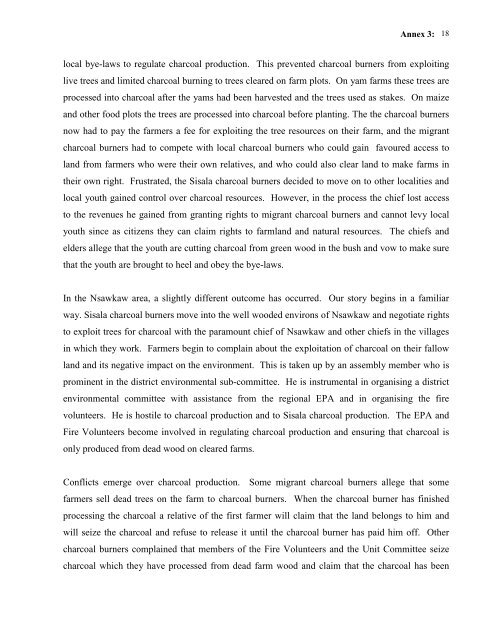Poverty Dimensions of Public Governance and Forest Management ...
Poverty Dimensions of Public Governance and Forest Management ...
Poverty Dimensions of Public Governance and Forest Management ...
Create successful ePaper yourself
Turn your PDF publications into a flip-book with our unique Google optimized e-Paper software.
Annex 3: 18<br />
local bye-laws to regulate charcoal production. This prevented charcoal burners from exploiting<br />
live trees <strong>and</strong> limited charcoal burning to trees cleared on farm plots. On yam farms these trees are<br />
processed into charcoal after the yams had been harvested <strong>and</strong> the trees used as stakes. On maize<br />
<strong>and</strong> other food plots the trees are processed into charcoal before planting. The the charcoal burners<br />
now had to pay the farmers a fee for exploiting the tree resources on their farm, <strong>and</strong> the migrant<br />
charcoal burners had to compete with local charcoal burners who could gain favoured access to<br />
l<strong>and</strong> from farmers who were their own relatives, <strong>and</strong> who could also clear l<strong>and</strong> to make farms in<br />
their own right. Frustrated, the Sisala charcoal burners decided to move on to other localities <strong>and</strong><br />
local youth gained control over charcoal resources. However, in the process the chief lost access<br />
to the revenues he gained from granting rights to migrant charcoal burners <strong>and</strong> cannot levy local<br />
youth since as citizens they can claim rights to farml<strong>and</strong> <strong>and</strong> natural resources. The chiefs <strong>and</strong><br />
elders allege that the youth are cutting charcoal from green wood in the bush <strong>and</strong> vow to make sure<br />
that the youth are brought to heel <strong>and</strong> obey the bye-laws.<br />
In the Nsawkaw area, a slightly different outcome has occurred. Our story begins in a familiar<br />
way. Sisala charcoal burners move into the well wooded environs <strong>of</strong> Nsawkaw <strong>and</strong> negotiate rights<br />
to exploit trees for charcoal with the paramount chief <strong>of</strong> Nsawkaw <strong>and</strong> other chiefs in the villages<br />
in which they work. Farmers begin to complain about the exploitation <strong>of</strong> charcoal on their fallow<br />
l<strong>and</strong> <strong>and</strong> its negative impact on the environment. This is taken up by an assembly member who is<br />
prominent in the district environmental sub-committee. He is instrumental in organising a district<br />
environmental committee with assistance from the regional EPA <strong>and</strong> in organising the fire<br />
volunteers. He is hostile to charcoal production <strong>and</strong> to Sisala charcoal production. The EPA <strong>and</strong><br />
Fire Volunteers become involved in regulating charcoal production <strong>and</strong> ensuring that charcoal is<br />
only produced from dead wood on cleared farms.<br />
Conflicts emerge over charcoal production. Some migrant charcoal burners allege that some<br />
farmers sell dead trees on the farm to charcoal burners. When the charcoal burner has finished<br />
processing the charcoal a relative <strong>of</strong> the first farmer will claim that the l<strong>and</strong> belongs to him <strong>and</strong><br />
will seize the charcoal <strong>and</strong> refuse to release it until the charcoal burner has paid him <strong>of</strong>f. Other<br />
charcoal burners complained that members <strong>of</strong> the Fire Volunteers <strong>and</strong> the Unit Committee seize<br />
charcoal which they have processed from dead farm wood <strong>and</strong> claim that the charcoal has been
















